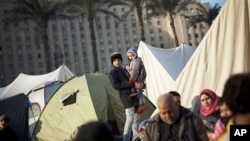U.S. President Barack Obama has said that Egypt will not return to what it was before the pro-democracy protests that started in the country on January 25. VOA’s Susan Yackee turned to The Economist’s Middle East correspondent, Max Rodenbeck, for an assessment of the situation.
Asked about whether he agrees with President Obama’s assertion that there is no turning back on the changes that have been unleashed in Egypt, Rodenbeck said he does to a large degree concur.
|
Listen to the full interview with Max Rodenbeck:
|
“I do, although it is not clear what the outcome is going to be. I think Egypt has changed pretty much for good. There are still several scenarios as to how much change there is going to be. It is clear that Hosni Mubarak will not be the president for much longer. He said he would retire in seven months, but it could happen sooner than that,” he said.
Rodenbeck added that there is also a lot of other pressure on the regime in addition to the calls directed at Mubarak. He said the other calls are for political reform, but right now the protesters are still testing to see how far they can go with their demands.
The Economist correspondent said that among the demands, is a call to repeal the state of emergency laws that have been in effect since Mubarak took office thirty years ago. The laws give security forces broad powers to conduct arbitrary arrests and allow them to keep people in almost indefinite detention. Rodenbeck believes that the abolishment of these laws would be a sign of real change.
Other demands, said Rodenbeck, deal with rights enjoyed by people in other democracies, such as the free formation of political parties and free elections that would be overseen not only by internal independent arbiters, but also by international observers.
Where the sides differ is in the approach to change, Rodenbeck said. He added that while the existing government seems to be willing to initiate reform only within the existing institutional and constitutional framework, protesters are calling for wholesale change. The current negotiations between the two sides are about determining how far each is willing to go, but Rodenbeck believes that they would be better off scrapping the existing system and starting from scratch. It’s an unlikely scenario, though, he said.
“There is too much fear on the part of those who still wield authority, the army, sort of the inner state of Egypt. They fear losing control and they fear chaos, and they are going to try to have the pace of reform be measured and slow,” Rodenbeck said.
As for any future role in Egypt for the Muslim Brotherhood that has been outlawed and marginalized by Mubarak’s regime, Rodenbeck acknowledges that it has a sizeable constituency, but doubts that any one of their members would garner enough support to become Egypt’s next president.















